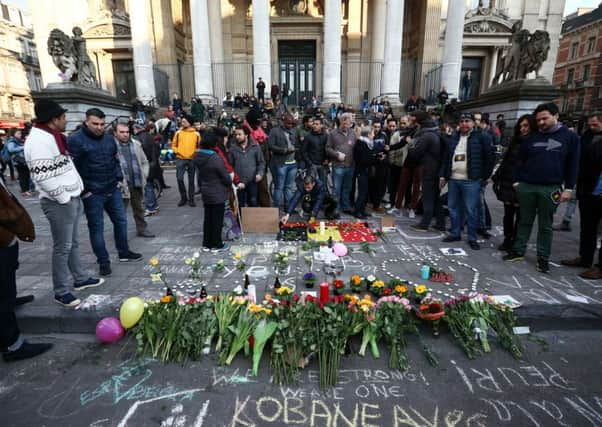Leader comment: New security measures needed to defeat IS


It was the nightmare that European officials had warned about. Belgian interior minister Jan Jambon had said on Monday that his country was on the highest level of alert for possible revenge attacks after the capture on Friday of Salah Abdeslam, the main surviving suspect from the Paris attacks in November.
Yesterday’s brutal attacks on the heart of Brussels that have killed at least 31 people and critically injured many more have sent shock waves throughout Europe. What makes it all the more upsetting is that although the city was braced for an attack to happen it was unable to prevent it.
Advertisement
Hide AdAdvertisement
Hide AdIt was all the more terrifying to see just how quickly a terrorist network can take their bloody revenge with such devastating effect.
These attacks were designed for maximum impact. And it was not just the people of Brussels who were subject to the terrorists’ brutality but all of Europe – in fact, the whole world.
Suicide attacks on major public sites such as an airport departure terminal, and metro stations awash with people during rush hour, are not just targeting local people but tourists too.
It is now a fact that no-one who is against the cold-hearted and evil brutality of Islamic State (IS) is safe. The terrifying reality is there are sure to be more attacks.
It is clear that intelligence will not win through to prevent attacks every time. Despite security levels in Brussels being at the highest possible level, it remained a soft target to IS. So even if countries up their levels to red alert, the truth is it is impossible to be 100% safe from random suicide attacks. But there are other steps that can be taken which can help minimise the threat. There is praise for the effectiveness of Israel’s efforts at suspect profiling as a means of identifying risks, but the techniques are invasive and still in their infancy and as yet the results have not been reported.
In Britain, we prefer to use intelligence gathering measures, such as collecting internet chatter and other electronic communications between IS leaders and their recruits. It has worked before and, we hope, it will continue to work but requires close and full co-operation with our neighbours.
But we need more. For the safety of innocent people, some things which we once thought unthinkable now need to be considered. We have to accept that the look of our cities may need to change. This threat is not going away.
The time has come for us to start considering the possibility of introducing armed police on the streets. Yes, the thought of this sends shudders down many spines. But we have to be grown-up about this new, constant and brutal threat we live under.
Advertisement
Hide AdAdvertisement
Hide AdWe also need to look at introducing screening for explosives and the use of sniffer dogs at areas where there are large crowds – football stadiums, music concerts, transport hubs and so on – as a matter of routine. Anywhere that crowds will gather, and the softer the target the better, will be sought out by terrorists.
To have any chance of winning this war against IS we have to find new ways protect this country – and our neighbours.
In the words of French president François Hollande, the response from Europe will need to be “calm, lucid and determined” – and it will have to last for a long time.
Holyrood’s income tax gauntlet
Some middle-class Scots are now on course to pay more income tax than their peers anywhere else in the UK next year. The SNP’s decision not to copy George Osborne’s plan to protect them from the 40p rate if they win May’s Holyrood elections was bold. But was it right?
Holyrood now has the power to set the threshold and by not raising it for the higher 40p rate of income tax, Nicola Sturgeon has stuck to her guns. The 53,000 higher rate taxpayers will not save the £400 a year as their counterparts south of the Border. The SNP says it is “not the right time” for high earners to pay less tax.
The move will raise £1.2 billion more for public services, Sturgeon says. The First Mnister’s move is to be welcomed because isn’t that what being given tax-raising powers is all about? There is no point putting up for a fight for powers you are not actually willing to utilise for what you believe it best for society.
Many opponents said the SNP had a chance to be bold. Labour’s Kezia Dugdale said the SNP “bottled it” while Lib Dem leader Willie Rennie branded the package “pathetically timid”. There is no doubt that the tax powers on offer can be used to far greater effect, and, on balance, it is probably fair to say the SNP hasn’t been bold enough. These much sought-after powers could have been used to raise more funds or re-balance who contrinutes what at a time when many services are under great prssure. The fact is that rather than have fiscal policy dictated by Westminster, Scotland now has a far greater ability to shape the nation we live in. Politicians should make use of the powers.